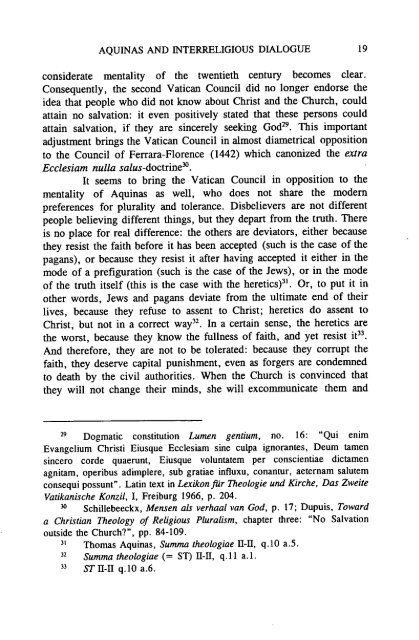Jaarboek Thomas Instituut 1997 - Thomas Instituut te Utrecht
Jaarboek Thomas Instituut 1997 - Thomas Instituut te Utrecht
Jaarboek Thomas Instituut 1997 - Thomas Instituut te Utrecht
Create successful ePaper yourself
Turn your PDF publications into a flip-book with our unique Google optimized e-Paper software.
AQUINAS AND INTERRELIGIOUS DIALOGUE 19<br />
considera<strong>te</strong> mentality of the twentieth century becomes clear.<br />
Consequently, the second Vatican Council did no longer endorse the<br />
idea that people who did not know about Christ and the Church, could<br />
attain no salvation: it even positively sta<strong>te</strong>d that these persons could<br />
attain salvation, if they are sincerely seeking God29• This important<br />
adjustment brings the Vatican Council in almost diametrical opposition<br />
to the Council of Ferrara-Florence (1442) which canonized the extra<br />
Ecclesiam nulla salus-doctrineJO•<br />
It seems to bring the Vatican Council in opposition to the<br />
mentality of Aquinas as well, who does not share the modem<br />
preferences for plurality and tolerance. Disbelievers are not different<br />
people believing different things, but they depart from the truth. There<br />
is no place for real difference: the others are deviators, either because<br />
they resist the faith before it has been accep<strong>te</strong>d (such is the case of the<br />
pagans), or because they resist it af<strong>te</strong>r having accep<strong>te</strong>d it either in the<br />
mode of a prefiguration (such is the case of the Jews), or in the mode<br />
of the truth itself (this is the case with the heretics)". Or, to put it in<br />
other words, Jews and pagans devia<strong>te</strong> from the ultima<strong>te</strong> end of their<br />
lives, because they refuse to assent to Christ; heretics do assent to<br />
Christ, but not in a correct way". In a certain sense, the heretics are<br />
the worst, because they know the fullness of faith, and yet resist it33•<br />
And therefore, they are not to be tolera<strong>te</strong>d: because they corrupt the<br />
faith, they deserve capital punishment, even as forgers are condemned<br />
to death by the civil authorities. When the Church is convinced that<br />
they will not change their minds, she will excommunica<strong>te</strong> them and<br />
29 Dogmatic constitution Lumen gentium, no. 16: "Qui enim<br />
Evangelium Christi Eiusque Ecclesiam sine culpa ignoran<strong>te</strong>s, Deum tarnen<br />
sincero corde quaerunt, Eiusque volunta<strong>te</strong>m per conscientiae dictamen<br />
agnitam, operibus adimplere, sub gratiae influxu, conantur, ae<strong>te</strong>rnam salu<strong>te</strong>m<br />
consequi possunt". Latin <strong>te</strong>xt in Lexikon for Theologie und Kirche, Das Zwei<strong>te</strong><br />
Yaiikanische Konzil, I, Freiburg 1966, p. 204.<br />
30 Schillebeeckx, Mensen als verhaal van God, p. 17; Dupuis, Toward<br />
a Christian Theology of Religious Pluralism, chap<strong>te</strong>r three: "No Salvation<br />
outside the Church?", pp. 84-109.<br />
31 <strong>Thomas</strong> Aquinas, Summa theologiae II-II, q.l0 a.S.<br />
32 Summa theologiae (= ST) II-II, q.ll a.l .<br />
33 ST II-II q.lO a.6.








